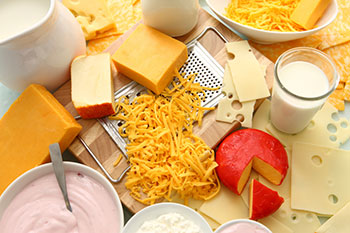More Health and Nutrition Bites
Related
Drinking milk and risk of hip fractures
It's a tenet of nutrition, handed down from our parents and grandparents, and backed up by clever marketing campaigns. The specific message might vary, but the underlying belief is: "Drink milk for strong bones."
Should you take Vitamin D for your bones?
About a year ago a friend of mine started jogging. Like me, she was a bicyclist, but she was looking to change up her exercise routine. While bicycling gives you plenty of leg muscle, however, it doesn't get your shinbones used to the pounding that they take in running.
Vitamin D in Foods
There is mounting evidence that many of us are increasingly deficient in Vitamin D. While there is some controversy about the health impact of this, it seems that changes in our diet in the last few years towards fewer foods rich in Vitamin D has led to a much lower intake.
Health & Nutrition Bites
Get the latest health and diet news - along with what you can do about it - sent to your Inbox once a week. Get Dr. Gourmet's Health and Nutrition Bites sent to you via email. Sign up now!
Milk and ovarian cancer

In 2018 I reported on a randomized controlled trial that concluded that taking Vitamin D supplements was unlikely to prevent cancer except in black participants - regardless of whether they had adequate Vitamin D levels at the start of the study. Yet research continues into the possible links between Vitamin D and calcium, dairy products as a source of both, and various cancers.
A team of scientists recently published a meta-analysis of 29 case-control and cohort studies that focused on types of dairy intake, Vitamin D and calcium intake, and the risk of ovarian cancer (Brit J Nutr https://doi.org/10.1017/S0007114520001075).
Out of those studies, the vast majority (23) looked at the association between risk of ovarian cancer and the participants' consumption of dairy products and lactose (a sugar found in dairy products). 13 studies assessed calcium intake and ovarian cancer, and 10 looked at calcium intake. (Some studies focused on more than one measure of intake.)
When the authors compared those with the highest versus the lowest intake of total dairy products, there was no association, positive or negative, found between total dairy product intake and ovarian cancer.
When the researchers drilled down into specific types of dairy products, however, they found that those with a higher intake of whole milk were 35% more likely to develop ovarian cancer than those in the lowest level of intake.
On the other hand, those who consumed the most low-fat milk were 16% less likely to develop ovarian cancer. Intakes of skim milk, yogurt, cheeses, and lactose intake in general had no effect on ovarian cancer risk.
As some of the studies did not specify whether their participants' calcium intakes were from the foods they ate as opposed to taking supplements, the authors could only report on calcium intake as a whole. Compared to those with the lowest calcium intake from all sources, those with the highest calcium intake were 29% less likely to develop ovarian cancer. When they calculated the risk only for those taking calcium supplements, however, the decrease in ovarian cancer risk was described as "marginal" (at 19%).
Higher levels of Vitamin D from dietary sources were associated with a 20% lower risk of ovarian cancer, but when the authors assessed the risk for all sources of Vitamin D there was no significant association either way.
Given these results, the authors conclude that "consumption of whole milk was positively associated with ovarian cancer risk, whereas consuming large amounts of low-fat milk, dietary calcium, and dietary vitamin D were negatively associated with ovarian cancer risk."
What this means for you
These result should be interpreted with caution as they are from case-control and cohort studies and not randomized controlled trials. Still, this seems to support the idea that getting your vitamins from your diet is superior to taking supplements. Further, this supports the Mediterranean Diet's emphasis on low-fat and fermented dairy instead of whole milk.
Here are some other recipes using fermented or low-fat dairy:
Baked Yam with Sour Cream
Steak Au Poivre
French Onion Dip
Beef Stroganoff with Egg Noodles
Crab and Horseradish Salad
Roasted Garlic Mashed Potatoes | Low Sodium Version
Creme Brulee
Creamed Peas
First posted: April 29, 2020

